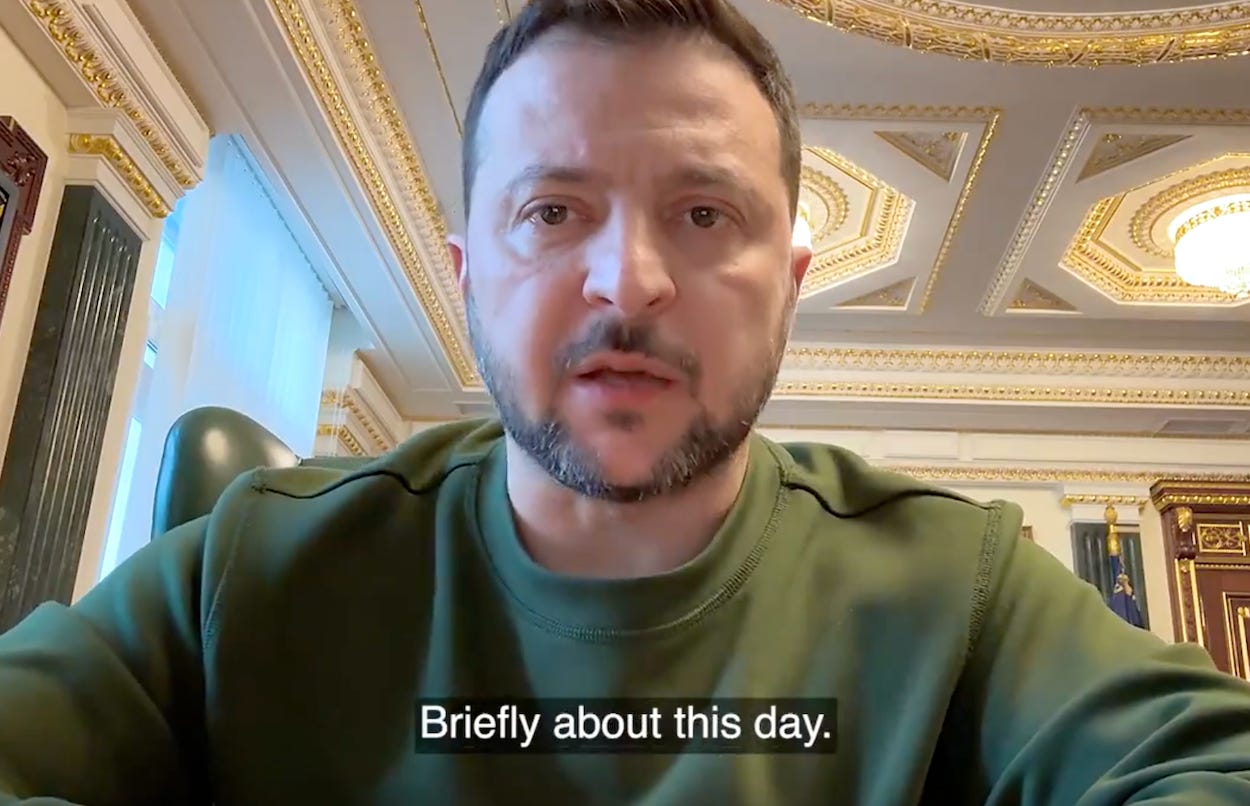Zelensky: Ukraine Will Lose War Without Another $60 Billion from American Taxpayers
Ukraine already lost the war and should negotiate for peace
Ukrainian President Volodymyr Zelensky and the Western media want you to believe that Ukraine is just $60 billion from American taxpayers away from victory against Russia.
MEDVEDEV: MOSCOW ATTACKERS WERE HEADED TO UKRAINE TO BE PAID
NETANYAHU TO BIDEN: FUCK YOU AGAIN
“It’s important to specifically address the Congress: if the Congress doesn’t help Ukraine, Ukraine will lose the war,” he said in an interview on Sunday with UNITED24, according to CNN. “If Ukraine loses this war, other countries will be attacked. This is a fact.”
The U.S. has been bankrolling Ukraine’s losing effort. Washington has contributed over $73 billion in aid since the start of the conflict, according to the Kiel Institute for the World Economy.
Europe is desperate for the U.S. to continue funding the war because the warmongers there sell the lie that Russian President Vladimir Putin would keep expanding west. These countries would have to “at least double its current military support efforts in case there is no further support from the United States,” Kiel said. “The EU countries are among the richest in the world and so far they have spent not even 1 percent of their 2021 GDP to support Ukraine.”
Ukraine never had a chance against Russia. And it will be the same media whores who told you Ukraine was winning who will sell the new line of propaganda.
Since before the war began, The Trends Journal has said “that the longer the war in Ukraine drags on the more people will die, the more infrastructure will be badly damaged, and the closer the world inches to fighting WWIII.”
The U.S. goal in Ukraine was to weaken Russia. Secretary of State Lloyd Austin said it clearly in the first few weeks of the war that he wants to make sure “Russia [is] weakened to the degree that it can’t do the kinds of things that it has done in invading Ukraine.”
The Biden administration did not run from Austin’s comment, and a National Security Council spokesman said the defense chief’s comments were consistent with the White House and that is to “make this invasion a strategic failure for Russia.”
Shortly after the invasion, U.S. Secretary of State Antony Blinken said the war has already been a “strategic failure for Moscow.”
As we’ve said, the Ukraine War would have ended long ago had the United States, NATO and its allies had not supplied Kyiv with weapons, money and military advisors.
You don’t need a great memory to remember the time the Western media tried to describe the spring 2023 counteroffensive (which began just before summer) as a likely turning point in the war, where Ukraine would be able to push the Russians out of the country in humiliation.
We accurately said Zelensky would run into a brick wall against Russia, and that’s exactly what happened.
In November 2022, Mark A. Milley, the former chairman of the Joint Chiefs of Staff, jolted Washington when he agreed with us and said Ukraine may want to consider peace negotiations.
“We’ve seen the Ukrainian military fight the Russian military to a standstill. Now, what the future holds is not known with any degree of certainty, but we think there are some possibilities here for some diplomatic solutions,” he said in an interview with CNBC.
His comments were remarkable at the time, because the Biden administration promoted only war up until that point, and Milley seemed like a powerful voice who could affect change.
But he did a quick about-face after facing severe backlash from pro-war Washington think tanks and politicians. He later changed his tune and said Russia already lost the conflict.
“They’ve lost strategically, they’ve lost operationally and, I repeat, they’ve lost tactically,” he said. “What they’ve tried to do, they’ve failed at. The strategic reframing of their objectives, of their illegal invasion, have all failed, every single one of them.”
That, of course, was not true. His first comment was true. You don’t become the chairman of the Joint Chiefs of Staff without “getting along” in Washington.
Politico ran an article months later, when it became clear that Ukraine would not win, titled: “Milley Had a Point.”
Politico quoted one U.S. official, “who didn’t want to run afoul of the administration by offering real views on the record, said the realities of the counteroffensive are sinking in around Washington.”
“We may have missed a window to push for earlier talks,” the official said. The official said, “Milley had a point.”
TRENDPOST: We maintain our forecast that Ukraine will not gain back its territory.
For all of U.S. President Joe Biden’s mistakes and failures, he is what you call a political survivor. When his ship hits an iceberg, he is the captain who is the first person seated in a lifeboat. We’ve reported in previous issues that George Packer recalled Classic Biden in his 2019 book called, “Our Man: Richard Holbrooke and the End of the American Century.”
Packer wrote that Biden, who was vice president in 2010, told Holbrook that the U.S. should pull out of Afghanistan despite the certain humanitarian tragedy.
“Fuck that. We don’t have to worry about that,” Biden reportedly told Holbrooke. “We did it in Vietnam. Nixon and Kissinger got away with it.”
No more funding for Ukraine. The war is over.
TRENDPOST: Last September, John Mearsheimer, a distinguished professor in political science at the University of Chicago, and Sebastian Rosato, the professor of political science at Notre Dame, penned a column titled, “The Russian Invasion Was a Rational Act.”
They noted how—in the early days of the invasion—Putin was described as a madman. They quoted Nina Khruschcheva, a Russia expert, who said, “with his unprovoked assault, Mr. Putin joins a long line of irrational tyrants.”
Part of the reason that many in the West considered Putin irrational, was the thought that he would be unable to emerge victorious from the conflict. But the two scholars note that rationality “is not about outcomes. Rational actors often fail to achieve their goals, not because of foolish thinking but because of factors they can neither anticipate nor control.”
But they wrote that Putin’s concerns about Ukraine is not a “lone wolf” theory. It is shared in Russia—and understood by some in the West, like William Burns, the current CIA director who once served as ambassador to Russia. In 2008, he called Ukraine’s entry into NATO the “the brightest of all redlines for the Russian elite (not just Putin). In more than two and a half years of conversations with key Russian players, from knuckle-draggers in the dark recesses of the Kremlin to Putin’s sharpest liberal critics, I have yet to find anyone who views Ukraine in NATO as anything other than a direct challenge to Russian interests… I can conceive of no grand package that would allow the Russians to swallow this pill quietly.”
Ukraine is mainly flat farmland and has been used by Napoleon, Imperial Germany, and Nazi Germany to stage attacks under Moscow’s soft underbelly.
Thomas Friedman, The New York Times columnist, wrote an article back in May 1998—the year Poland became a member of the alliance—that included a quote from George Kennan, a diplomat credited for his strategy of U.S. Cold War containment:
“I think this is the beginning of a new Cold War. I think the Russians will gradually react quite adversely and it will affect their policies. I think it is a tragic mistake. There was no reason for this whatsoever. No one was threatening anybody else. Of course, there’s going to be a bad reaction from Russia and then [NATO expanders] will say that we always told you that is how the Russians are—but that is just wrong.”
He wrote that Russia, in turn, will turn to countries like Iran and China to counter the development. Kennan wrote in his diary that NATO expansion was the “greatest mistake of the entire post-Cold War period” and called it a “colossal blunder.”
His warning did not stop Warsaw, the Czech Republic, and Hungary from being added to the Alliance in 1999 and then countries like Estonia, Latvia, Lithuania, Slovakia, Slovenia, and Romania in 2004.




